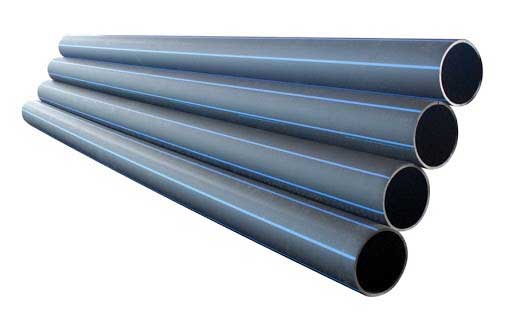Pipe Manufacturing Midland TX: Process Explained
Recognizing the Secret Advantages of HDPE Pipeline for Water and Wastewater Administration
Making use of HDPE pipe in water and wastewater management presents numerous advantages that merit factor to consider. Its exceptional durability and long life-span make it a favored option for numerous tasks. In addition, the product's resistance to rust and chemical damage boosts its reliability in different settings. Nonetheless, the benefits extend beyond just durability and resistance. Discovering its cost-effectiveness and environmental impact reveals even much more compelling reasons for its prevalent adoption in modern facilities
Outstanding Durability and Longevity

HDPE pipeline sticks out for its remarkable resilience and long life, making it a recommended choice in water management systems. Built from high-density polyethylene, these pipes can stand up to substantial pressure and anxiety, guaranteeing trustworthy efficiency in time. Their robust nature enables them to endure severe ecological problems, including temperature level variations and soil movements, which can cause various other products to stop working.
The life-span of HDPE pipelines frequently exceeds half a century, offering an affordable solution for communities and industries alike. Additionally, the product's lightweight buildings simplify setup, minimizing labor costs and timeframes. This toughness decreases the need for regular repairs or substitutes, additionally boosting its financial allure.
In water monitoring applications, the dependability of HDPE pipes suggests less interruptions and improved service continuity, making them indispensable to lasting infrastructure development. The mix of sturdiness and longevity solidifies HDPE's role as a foundation in reliable water administration remedies.

Resistance to Deterioration and Chemical Damages
While several products succumb to rust and chemical damage in time, HDPE pipelines exhibit exceptional resistance, making them optimal for different water administration applications. This durability originates from the molecular framework of high-density polyethylene, which is naturally non-reactive and does not rust like steels or deteriorate from exposure to harsh chemicals. Consequently, HDPE is very efficient in atmospheres with hostile substances, such as wastewater systems that might contain acids, bases, and organic solvents.
Additionally, HDPE pipes can hold up against ecological variables such as dirt acidity and saline problems, additionally improving their suitability for varied applications (American Plastics HDPE Pipe for Oilfield). Their ability to preserve architectural stability with time decreases the threat of leakages and failures, which is important in guaranteeing the security and dependability of water distribution and wastewater management systems. As a result, the resistance to rust and chemical damages substantially adds to the general effectiveness and long life of HDPE piping services
Cost-Effectiveness and Financial Advantages
When thinking about the financial effects of water administration systems, the cost-effectiveness of HDPE pipelines comes to be obvious. These pipelines offer lower setup and maintenance prices compared to standard products like steel or concrete. Their light-weight nature simplifies transportation and installment, leading to minimized labor costs. Furthermore, HDPE pipelines display a lengthy life expectancy, frequently surpassing 50 years, which equates to less substitutes and long-term financial savings.
Furthermore, the resistance of HDPE to corrosion and chemical damages lessens the need for costly repair services and substitutes. The pipes additionally support reliable water flow, lowering energy costs connected with pumping systems. By reducing leakages and water loss, HDPE pipelines contribute to substantial financial advantages for towns and industries alike. Generally, the first investment in HDPE piping can produce significant economic returns over the lifespan of pvc plumbing fittings the water administration system, making it a prudent choice for sustainable framework development.
Ecological Sustainability and Reduced Effect

Convenience and Flexibility in Installation
Because of their unique properties, HDPE pipes provide impressive convenience and versatility in installment, making them ideal for a large range of applications. Their lightweight nature permits much easier handling and transportation, minimizing labor prices and installation time. HDPE pipelines can be curved and formed to fit various surfaces and task needs, which is especially beneficial in challenging settings.
Furthermore, their resistance to corrosion and chemical damage enables for installment in diverse settings without the demand for specialized protective layers. i loved this The capacity to fuse joints develops a constant, leak-free system, enhancing the overall integrity and dependability of the installment. HDPE's adaptability likewise suits ground movement, minimizing the threat of damages in locations vulnerable to moving dirt. On the whole, these characteristics make HDPE pipes not only functional however also a favored option for water and wastewater monitoring systems.
Regularly Asked Concerns
Just How Does HDPE Pipeline Contrast to PVC in Water Administration Applications?
HDPE pipe uses premium versatility, resistance to corrosion, and resilience contrasted to PVC. Its lighter weight promotes easier setup, while its long lifespan minimizes substitute prices, making HDPE a recommended selection in water management applications.
What Is the Lifespan of HDPE Pipeline Under Typical Conditions?
Under regular conditions, HDPE pipes can have a life expectancy ranging from 50 to 100 years. Their toughness and resistance to corrosion add to their long-term performance in numerous applications, making them a dependable selection for framework.
Are HDPE Piping Recyclable After Their Life Span?
Yes, HDPE pipelines are recyclable after their solution life. Texas hdpe pipe manufacturer. They can be refined and repurposed right into brand-new products, greatly decreasing ecological impact and advertising sustainability within the market, making them a green choice for piping services
What Is the Installment Refine for HDPE Pipes?
The setup procedure for HDPE pipelines involves site prep work, trenching, pipe blend or mechanical joining, backfilling, and pressure testing. Correct strategies assure a long lasting and efficient system for carrying water and wastewater successfully.
Can HDPE Piping Be Made Use Of for Both Drinkable and Non-Potable Water Systems?
Yes, HDPE pipelines can be made use of for both drinkable and non-potable water supply. Their adaptability, resilience, and resistance to corrosion make them ideal for numerous applications, guaranteeing risk-free and effective transportation of water in different contexts.